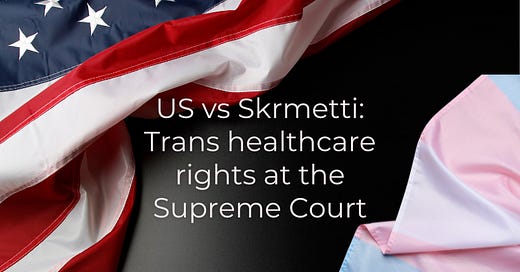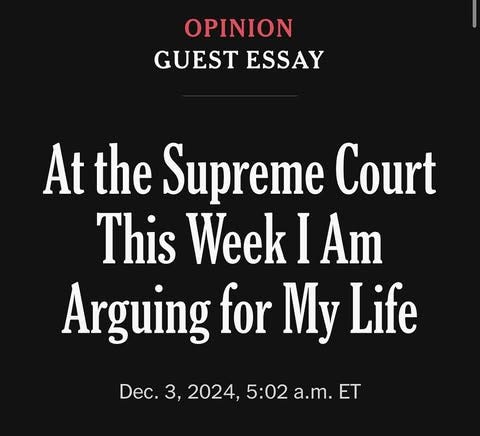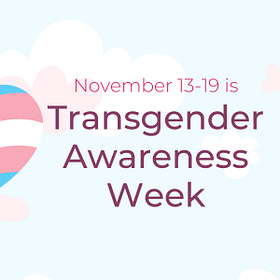US vs Skrmetti: Trans healthcare rights at the Supreme Court
What it feels like to have the justices discussing hormones
I’ve been thinking a lot about how important it is to have access to healthcare, especially because trans healthcare has been in the news this week. In Senate Bill 1, Tennessee is attacking not only trans rights but also parental rights, and arguing that lawmakers, not doctors, should dictate medical care. The case that their law is unconstitutional made it all the way to the Supreme Court.
The US Supreme Court heard oral arguments for US vs Skrmetti on Wednesday Dec. 4th. The issue, as described by scotusblog.com, is:
Whether Tennessee Senate Bill 1, which prohibits all medical treatments intended to allow “a minor to identify with, or live as, a purported identity inconsistent with the minor’s sex” or to treat “purported discomfort or distress from a discordance between the minor’s sex and asserted identity,” violates the equal protection clause of the 14th Amendment.
I listened online to the last hour or so of the arguments, imagining Chase Strangio, ACLU lawyer, standing in front of the justices, not only embodying being trans himself, but with conviction describing how this legislation treats people differently based on their sex.
Strangio writes for the New York Times, “My presence at the Supreme Court as a transgender lawyer will have been possible because I have had access to the very medical treatment at the center of the case. Though some doubt the lifesaving properties of this care, I know them personally. And so do my clients.”
The amount of misinformation brought by the other side was stunning, if not surprising.
Mr. Rice, the Solicitor General of Nashville, TN, on behalf of Skrmetti et al. said, “If you give [testosterone] to a girl, it renders the girl infertile.” He later said, “…these treatments, which are irreversible often, have significant effects on minors and often leave them with bodies that are infertile and permanently damaged…"
Fun fact, taking testosterone does not actually prevent pregnancy. Many trans men are prescribed and use progesterone-only birth control pills or other birth control methods while on gender-affirming hormone therapy. Some people choose to pause taking hormone therapy to get pregnant and have a baby.
Another fun fact, taking testosterone makes cis men less fertile. But apparently that’s not a reason to ban the medication for them. Yet another example of how this is blatantly sex discrimination.
While testosterone gender-affirming hormone therapy has a possibility of reducing fertility, Rice saying it “renders the [person] infertile” I think is implying that person can never have a baby after taking testosterone, which is false.
But what the statement about testosterone causing infertility reveals is that the anti-trans healthcare bans are related to reproductive freedom.
This is saying people shouldn’t be able to make choices about their body and their reproduction with the guidance and approval of their doctor, if the state says it knows better.
Tennessee, with this bill, not only attacks trans rights, but also gives the government the power to override the decisions of qualified medical professionals, parents, and patients themselves.
It felt uncomfortable, to say the least, to hear these personal, medical matters discussed (torn apart?) in such a public forum.
The statements made me realize, once again, how much of trans history, medical knowledge, and legal discrimination is widely known within our community and barely at all by the general public.
I was surprised that Justice Amy Coney Barrett did not know about the history of cross-dressing laws. These are laws that made it illegal to wear clothes determined to be of the other sex. Police could arrest people (commonly in gay bars and queer spaces) for not wearing at least 3 articles of clothing of the “correct” sex. Erin Reed reports on this:
These are not just abstract legal arguments about the past. The reason this case is so important is because access to medically necessary healthcare including puberty blockers and hormone therapy is crucial to the health and well-being of many trans people, some of them teens under 18.
As the ACLU reports, plaintiff Samantha Williams says, “It was incredibly painful watching my child struggle before we were able to get her the life-saving healthcare she needed. We have a confident, happy daughter now, who is free to be herself and she is thriving.” (All emphasis mine.)
Williams describes the threat to the family’s health and safety, “I am so afraid of what this law will mean for her. We don’t want to leave Tennessee, but this legislation would force us to either routinely leave our state to get our daughter the medical care she desperately needs or to uproot our entire lives and leave Tennessee altogether. No family should have to make this kind of choice.”
Williams’ daughter says, “I don’t even want to think about having to go back to the dark place I was in before I was able to come out and access the care that my doctors have prescribed for me. I want this law to be struck down so that I can continue to receive the care I need, in conversation with my parents and my doctors, and have the freedom to live my life and do the things I enjoy.”
So, what is this medical treatment for teenagers?
Well, it’s not surgery, in the vast majority of cases. (The exceptions would be, for example, a few trans teenagers who have chest reconstruction surgery. It’s worth noting for comparison that some cis teenage girls also have cosmetic surgeries including breast implants.)
We’re primarily talking about puberty blockers and gender-affirming hormone therapy.
Puberty blockers are (expensive, hard to obtain) medications that can be prescribed to both cis and trans children if their puberty hits too early, to give them a chance to have a puberty at a time which better suits their social and physical needs. When puberty blockers are stopped, the body continues with the course of puberty. The blocker merely delays the process.
Gender-affirming hormone therapy is arguably also prescribed to cis and trans people. From birth control to treatments for low testosterone, doctors prescribe estrogen, progesterone, and testosterone to a variety of people, as I have written about:
🌈 Everyone has hormones (yes, even you)
“Yeah, everyone has hormones. It's not all that different,” I responded to an online commenter. They had expressed concern about, get this, people being vaccinated while on gender-affirming hormone therapy.
A common argument against the use of these medications is that they cause irreversible effects. But, I mean, if they were truly and completely irreversible, someone would only need to take such a medication for a short time and then enjoy the irreversible effects for the rest of their life.
Many medications cause long-term effects, including hormone therapy and other medications which are available over the counter.
Consider Rogaine (minoxidil). I can buy it on Amazon without a prescription if I wanted to. Minoxidil is a topical medication which encourages hair to grow, on the scalp, face, or anywhere else on the body where it is applied. A man, woman, or nonbinary person of any age with access to a credit card can legally buy and apply this medication anywhere on their body, in the US, without even talking to a doctor.
On the flip side, testosterone is a Schedule III controlled medication. And on top of that, it’s an open question whether it’s going to be banned for trans people and available to be prescribed for cis people. That’s the sex discrimination which is at the heart of this case.
The Supreme Court will likely have its decision in June 2025.
It feels frustrating and scary to have people without medical degrees or personal experience determine our access to medical care. And, personally, I’m not holding my breath for a good outcome in this case.
But I am proud that our community documented our experience, in a number of briefs submitted to the justices. And I am proud and thankful that Chase Strangio defended our rights so eloquently at the Supreme Court.
If you’re not already subscribed to Erin Reed’s excellent reporting on this and other legal issues affecting trans people, today is your day to sign up! Her free articles are excellent, informative, and often hopeful.
If you’re looking for more expert reporting, please check out the TransLash Podcast with Imara Jones, who was in the courtroom watching the arguments on Wednesday:
Thanks so much for reading! Let me know what you think in the comments.
Take care,
Rey










Yes, this is problematic at best, because I cannot live right without my HRT. Years before that, I had to have estrogen & progesterone because my body had problems going through menopause. It stopped my menstrual cycle on purpose, but would not do so for AFAB's who are not going through menopause. I'm very frustrated that the government is so ignorant of the medical facts regarding hormone therapy. Thanks for turning me onto TransLash. I shall check them out.
Another interesting fact about testosterone with cismales. A friend of mine had low sperm count. They put him on testosterone and he was able to get his wife pregnant. So, I don't know about it having infertility problems with them. In his case, it increased their chances. They had tested his wife, who didn't have problems, so they tested him and found out about his sperm.